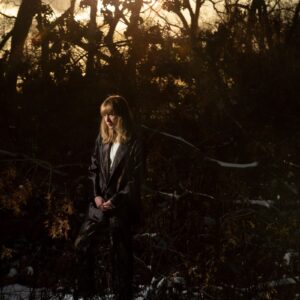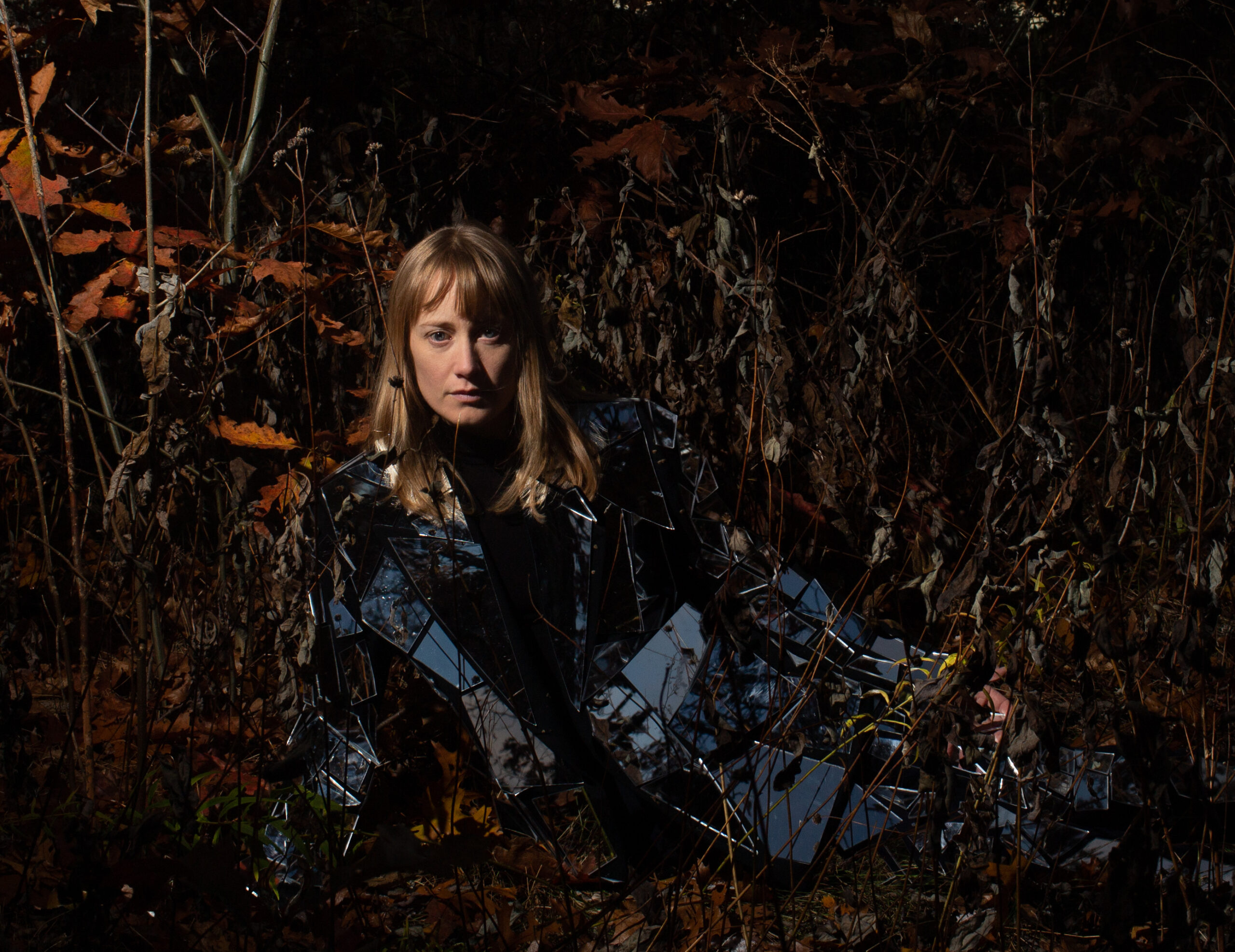Foto-© Dorsa
Wie weiter machen, wenn dein aktuelles Album dich urplötzlich ins Rampenlicht zerrt und als Konsensalbum des Jahres weltweit auf den Bestenlisten der Welt hoch oben rangiert? Tamara Lindeman, alias The Weather Station, ist es so letztes Jahr mit ihrem Album Ignorance ergangen – und sie hat sich entschieden das Pflaster der Erwartung einfach in einem schnellen Ruck abzureißen, indem sie schon wenige Monate später mit einem neuen Album aufwartet, das jedoch viel mehr als die kleine Schwester/der kleine Bruder des großen Vorgängers zu sehen ist. Es sind Lieder, die zur gleichen Zeit geschrieben wurden, die sich emotional verbinden und viele der gleichen Themen behandeln: Trennung und Konflikt, Liebe, Vögel und Klimagefühle. How Is It That I Should Look At The Stars ist ein Album von ungeheurer Sensibilität, eine Aufnahme einer Band und eines Menschen, die es wagen, ohne Entschuldigung nach Sanftheit zu greifen. Dabei sind die Songs introvertierter, spartanischer instrumentiert, entschleunigt – aber bei gleichbleibender Qualität, Intimität, nur eben mit mehr Raum für Stille, Details und Atem. Wir sprachen mit Tamara Lindeman über ihr neues Album – unser Interview!
 You have gone from Ignorance: this expansive, jazz inflected pop record, to something more stripped down, a collection of piano ballads. While it is apparent that a lot of these songs come from similar places, there is a clear choice to leave more space for quiet. Can you talk about that choice, and what made this a distinctive album of its own as opposed to part of an Ignorance deluxe or expanded release?
You have gone from Ignorance: this expansive, jazz inflected pop record, to something more stripped down, a collection of piano ballads. While it is apparent that a lot of these songs come from similar places, there is a clear choice to leave more space for quiet. Can you talk about that choice, and what made this a distinctive album of its own as opposed to part of an Ignorance deluxe or expanded release?
Ignorance was a big, long process of recording and overdubbing and strings and arranging and mixing. It was just a bigger, slower record, but then I had all these songs that were unrecorded and that were also written at the same time and that always had struck me as songs for myself, rather than songs for the world. They were like my little secret songs, and honestly the decision to record them was kind of a selfish move. I had always wanted to make a record that was recorded live, and I had a real affection for these songs. I think part of why the record is so gentle, calm, and beautiful is because in a way it was a reaction to the process of making a bigger record, but also that is just what made sense for the songs. In Toronto there is a whole scene of jazz adjacent music that is kind of avant-garde and very strange and I listen to a lot of that music, but I had never made music that was related to that, and I think that these records were really influenced by that scene and that music. Ignorance is very vulnerable, but the music is so powerful and strong, and How Is It That I Should Look at The Stars is the real softness at the heart of that.
What do you think the effect of the omission of that grandeur and texture is? Because I noticed that in some interviews you talk about the need to be able to feel dark and sad, and to be able to have dark and sad conversations with each other and not to constantly deflect. I wonder whether the idiom of the ballad allows you to do that more directly, but The Weather Station gained a lot of popularity with the unanimous critical acclaim for Ignorance, and because the record came this way around there is a clear omission of grandeur.
That’s actually something that really worries me [laughs]. I think if Ignorance had been smaller, I would be less worried about this record. I know this doesn’t make any sense.
No, I don’t think that’s true at all.
But I think that’s why How Is It That I Should Look at The Stars is a companion album. I recorded this long before Ignorance came out, and I didn’t know what would happen with Ignorance, and this was just really me wanting to do something for myself, but I definitely feel very proud of it because it feels incredibly earnest and sincere and it’s not cool. This is not what you think is going to go over well in the world.

It is asking the listener to have a lot of patience and there isn’t a lot of patience in contemporary listening.
I think that’s part of why I personally like the record because it feels so out of time. It is of this time emotionally, but not musically.
Right, because patience is kind of a radical gesture now.
Yes, it’s not the norm, it’s not going to do well on TikTok [laughs]. I like when music changes your state of mind and perception, and I think this record is very eyes open. If you are in the right mood to hear it, which is not all the time, I think it is very much music that is asking you to slow down and perceive. I guess you could say that a lot of what Ignorance is saying lyrically is “pay attention”, and if you are paying attention, How Is It That I Should Look at The Stars works and if you’re not it doesn’t.
Exactly, and the content of the lyrics kind of fit with that formal experience more on How Is It That I Should Look at The Stars because you are singing about the importance of intentionality and the damaging nature of ignorance.
That’s true, I hadn’t thought of that. That for the whole of Ignorance I keep saying repeatedly, “pay attention”, we’re not seeing things accurately. When I wrote out the lyrics for the layout, I noticed I keep talking about seeing.
 You said that you were writing them for yourself. That must be an interesting process because your writing and delivery feel very private and intimate, but the subject matter really points outwards. So, are you writing with a listener in mind, or do you only write for yourself?
You said that you were writing them for yourself. That must be an interesting process because your writing and delivery feel very private and intimate, but the subject matter really points outwards. So, are you writing with a listener in mind, or do you only write for yourself?
That’s a good question – I remember writing these songs and my initial feeling was that they were not for the record I was trying to write. At a certain point I thought to myself: “I don’t have a pace for these songs to go but I should write them for myself because they are really beautiful.” I guess I’m not really thinking of someone, but I do care a great deal about the listener and being understood. I think that some artists like to say that they don’t care about their lyrics and whether they are understandable, but I care very deeply about that. Maybe the listener I had in mind was sort of on a more timeless level. All the songs I’ve ever written are very idiosyncratic, they are very me, and not very universal. I think I was thinking about whether these were songs that somebody else can sing, “are these songs of the songbook?” I do think about the songbook of all time. Like all songs that have ever been written. Do my songs have a place, and do they have something to say to these other songs?
It’s sort of a strange question because I don’t think anybody writes a song not to communicate something.
Yeah, but it isn’t crazy – I’ve always noticed that when playing shows, if I know one person in the audience, often I find that I’m performing for them. When I don’t know anyone, it is a really different experience.
I want to go back to Ignorance the song, which is actually on How Is It That I Should Look at The Stars. In the song you sing about the man who reduced a bird to the name magpie, and you say he is confronted by the great expanse of his ignorance in the act of detaining it in language.
Well, in the song I really tried, lyrically, to specify. I was in Australia, and the bird that I heard is the Australian magpie, which is a bird that was named after the European magpie, but it’s not the same bird, it’s a really different species and different family of birds. So, there are actually several birds around the world that are named magpie because the folks from Europe were homesick. That happened all over the new world, where they named plants and animals after something from the old world. It’s not that I judge whoever named the Australian magpie, and I even looked it up and it wasn’t very clear. When I wrote the song it wasn’t off historical knowledge or anything. I didn’t mean to gender them, but it was definitely a man, it wasn’t going to be a woman who was working in biological nomenclature in the 1800s in Australia. It’s just that thing where you see something that you can’t understand. This bird is pretty astonishing, Australian magpies are incredibly intelligent and this thought that you could see something that you don’t understand like a creature you have never seen before, and what do you do with that? You are ignorant. I’m ignorant when I see a crow on the side of the road. I don’t know what it is or who it is. I think that’s what I’m really trying to express – it’s not just that the name is wrong, even though it is, because aboriginal people had several names for that bird, and somebody came along and was like “I’m homesick. I’m going to pretend this bird is this other bird.” In the song I also express that I’m overthinking it, but it really matters to me. It’s not that I’m arguing that we can’t name anything, but it is true that when you name something, you put it down. Especially when you name something inaccurately. I guess what I was trying to write about is the way we are towards the natural world. We reduce everything, and that doesn’t capture the essence of this bird or of anything. I do think that there is an instinct when you encounter something that you don’t understand, to put something else on it instead of trying to understand it.
 I think there is a sense in which this is an album about being deliberate and sincere about the ways that we interact with others and ourselves linguistically. It claims that there is an epidemic of repression and shame about the position we have put ourselves in with regards to topics like the climate crisis and becoming more alienated from the natural world in general, and that it has something to do with the way exchanges fail to reveal anything meaningful.
I think there is a sense in which this is an album about being deliberate and sincere about the ways that we interact with others and ourselves linguistically. It claims that there is an epidemic of repression and shame about the position we have put ourselves in with regards to topics like the climate crisis and becoming more alienated from the natural world in general, and that it has something to do with the way exchanges fail to reveal anything meaningful.
That is a good observation. Go on.
Well, there seems to be a politics of writing that is about the question of how we reform those bankrupt exchanges with the natural world.
That’s true. It’s not like I’m aware of trying to say that in a song though. Things come up and it is sometimes years later that I really understand what I was trying to say. You’re right that there is a lot of anxiety about expression and perception. I think it comes from recognising that the way we operate as a society is kind of bankrupt. We don’t know how to honour things. In that song I’m almost making fun of my own desire to draw meaning out of everything and yet I wouldn’t want to change that. We like to reduce and characterise and put things in boxes but in terms of climate and everything we’re going through as a people there is a lot of nebulous, uncharacterizable feelings happening.
The album is recorded live, and the effect is very intimate, and there are no drums or clear rhythmic lines in the songs so there is a different type of expansiveness. I wanted to ask what the experience of making an album with no drums at all is like because they of course add a lot of dynamics. Did you feel as though you were compensating for that in other ways, or was it liberating?
I think I just have two stars. In Ignorance I was deeply embracing the straight drums and that was exciting to me but for most of my life playing music I have been very arhythmic. I like to move the tempo around and I like to pause extra-long. I like both things. To me it’s not challenging to record without drums, it’s kind of exciting because it feels more natural in a way. This record was such a beautiful experience of being with humans in a room and feeling the tempo and dynamics evolve and exist and be in relation to the song and the performance and the moment rather than “we are playing this song at this speed no matter what.” Both things have real emotional power though.
What is coming up for you? There’s obviously the tour, I’m seeing you in May at Thekla in Bristol. How are you feeling about touring at the moment? What is your touring vibe? Do you love it? Do you prefer recording?
It’s hard, we are on our American tour which got cut in half. We are pretty sure we are going to be able to do our full UK and Europe tour, so that’s exciting because I love being over there and it has been years. But touring is hard right now, it has really changed. It’s difficult to navigate COVID because for us the consequences of somebody getting COVID is cancelled shows and not being able to cross the border and there is all this intensity that wasn’t there. We’ve not been dining in; we just have to exist in our own little bubble in our band which is alienating. It is hard to not interact with people and it is hard to not meet people at the shows and talk. I don’t know if that will continue but that is something I’ve really been struggling with. The world feels very confused, especially in America, I really feel the weight of everything that has happened in that couple of years in terms of climate and COVID. I do love playing shows, but the act of touring feels different than it did, it doesn’t feel as light as it used to. I feel a lot of guilt and confusion over it. I guess where that leaves me though is feeling that the shows that we do play feel more important and meaningful because I’m not sure that we should be doing this all the time. I don’t think anybody understands the financial and logistical mess that it is just to get to a club and play a show. It is hard. I feel grateful that we can do it at all.
I hope you can do it! Will there be a full band at the shows?
It will be full band. I’m excited.
Well maybe I’ll see you at the merch table!
The Weather Station Tour:
28.03.2022 Berlin, Frannz Club
04.04.2022 Hamburg, Nochtwache
05.04.2022 Köln, Blue Shell
06.04.2022 München, Milla
28.08.2022 Darmstadt, Golden Leaves Festival










